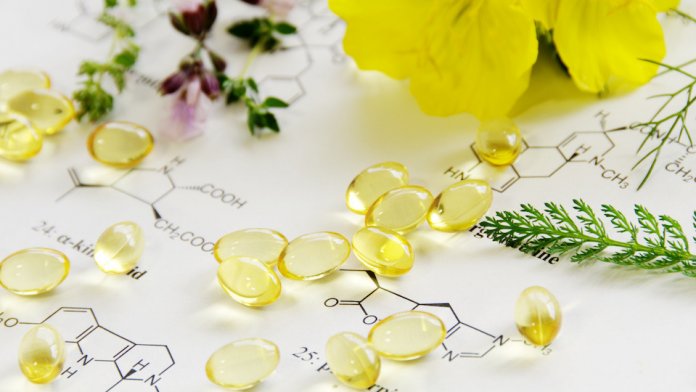Evening primrose or Oenothera biennis is a delicate yellow flower native to North America that blooms in the cool of the evening. Though it may not look like much, this lovely plant has a wealth of health benefits hidden within and was used in traditional Native American medicine for hundreds of years. Evening primrose oil (EPO) is created from the mature seeds of the flower and can be taken in capsule form to help alleviate a number of conditions.
Why does it work?
Many of the health benefits of EPO come from the presence of gamma-linolenic acid (GLA), an omega 6 fatty acid that can help decrease inflammation and reduce pain responses.
Help relieve hot flashes
A 2013 study published in the Archives of Gynecology and Obstetrics found that a daily dose of 500 milligrams of EPO was able to decrease the severity of hot flashes in menopausal women after six weeks of continued use. This is one of the oldest documented uses of this plant, and it has a wealth of anecdotal and scientific evidence to support its effectiveness.
Reduce eczema
People with eczema are often forced to turn to prescription creams and chemical treatments due to cracked, itchy, and inflamed skin. Fortunately, evening primrose oil may be a viable alternative to more harsh treatments. This oil focuses on the source, rather than the symptoms, and could help correct the imbalance in essential fatty acids that often leads to eczema.
There is some debate over this benefit of EPO; however, certain individuals have been able to find relief from their inflammatory skin conditions, so it doesn’t hurt to give it a try.
May improve heart health
In recent years, heart disease has taken over as the number one cause of death in the world. This largely preventable condition can be reversed by eating a whole foods diet and following the guidelines of a healthy lifestyle. Along with these actions, adding EPO to your supplement line-up could help reduce blood cholesterol levels and target inflammation in the body.
Osteoporosis
According to one 18-month study, EPO in conjunction with several other natural supplements was able to slow or reverse bone loss in older women with osteoporosis. In fact, participants experienced a 1.3% increase in femoral bone density, while the placebo group experienced a 2.3% decrease in bone density.
Alleviate breast pain
Menstruation comes with a number of uncomfortable symptoms that women live with and silently endure. If constant, distracting breast pain is on your list, you may want to consider taking evening primrose oil. Studies have shown that the GLA in EPO along with a daily vitamin E supplement, could help inhibit prostaglandins that cause breast pain and reduce inflammation in chest tissue.
Rheumatoid Arthritis
This autoimmune arthritis impacts the joints and can cause severe pain and immobility. Studies observing the GLA in evening primrose oil found that it could help provide moderate pain relief and increase mobility.
Clear up acne
Acne is not just a condition for hormonal teenagers. Many adults struggle with acne throughout their entire life due to various imbalances, stress, and inappropriate inflammatory responses. GLA can help reduce skin lesions and encourage moisture retention.
Note: Pregnant and breastfeeding women should avoid taking EPO as there is not enough evidence regarding its safe use during these times.
Discuss use with your doctor if any of the following apply to you:
-
- Bleeding disorder
-
- Recovering from surgery or are about to undergo surgery
-
- Any likelihood of seizures or epilepsy
- Are on any prescription medication
Keep in mind, though evening primrose oil is a natural remedy, it is still incredibly potent, and it is always best to speak with an expert before beginning self-treatment. Your naturopathic doctor will be able to help determine the appropriate dosage and provide you with a quality supplement. If you notice any adverse symptoms such as vomiting, unusual fatigue, or persistent headaches, discontinue use, and talk to your doctor.
-The UpWellness Team


